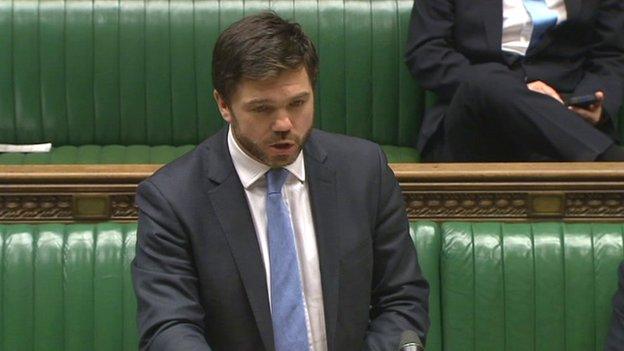Tax powers on the way as Wales Bill is passed
- Published

Stephen Crabb confirmed the offer of flexibility on income tax rates to Wales
Tax powers are on their way to Wales as a bill paving the way to further devolution completes its passage through Parliament.
Welsh Secretary Stephen Crabb hailed it as "a significant step forward on the path towards a lasting devolution settlement".
He said flexibility over income tax rates will help make the Welsh government more accountable.
However, devolution of income tax powers will be subject to a referendum.
Power over landfill taxes, stamp duty and the aggregates levy will pass to Cardiff Bay in 2018 as the Wales Bill becomes law, with Royal Assent expected by the end of the year.
'Handbrake U-turn'
Mr Crabb told MPs debating the bill on Wednesday that the so-called "lockstep" proposal ensuring all income tax bands change by the same amount was being dropped.
"The National Assembly for Wales will be able to set separate Welsh rates of income tax for each band," he told MPs.
Shadow Welsh Secretary Owen Smith accused the Conservatives of a "handbrake U-turn" on the lockstep, which he said the UK Treasury had previously defended as being necessary to ensure income tax was used as a tool to redistribute wealth across the whole of the UK.
The Pontypridd Labour MP urged the UK government to explain in more detail how tax devolution would benefit the people of Wales.
"The very least we owe the Welsh people is therefore to consider extremely carefully the likely impact of these radical changes to such a cornerstone of the union - that redistributive union - as taxation because they will have impacts on the potential prosperity and the wellbeing of the Welsh people," he said.
Mr Smith has previously claimed that due to its lower-wage economy Wales could have been up to £1bn worse off over the last four years if tax powers had been devolved.
- Published10 December 2014
- Published7 December 2014
- Published3 December 2014
- Published28 September 2014
- Published17 September 2014
- Published6 April 2016
- Published19 January 2014
- Published18 November 2013
- Published1 November 2013